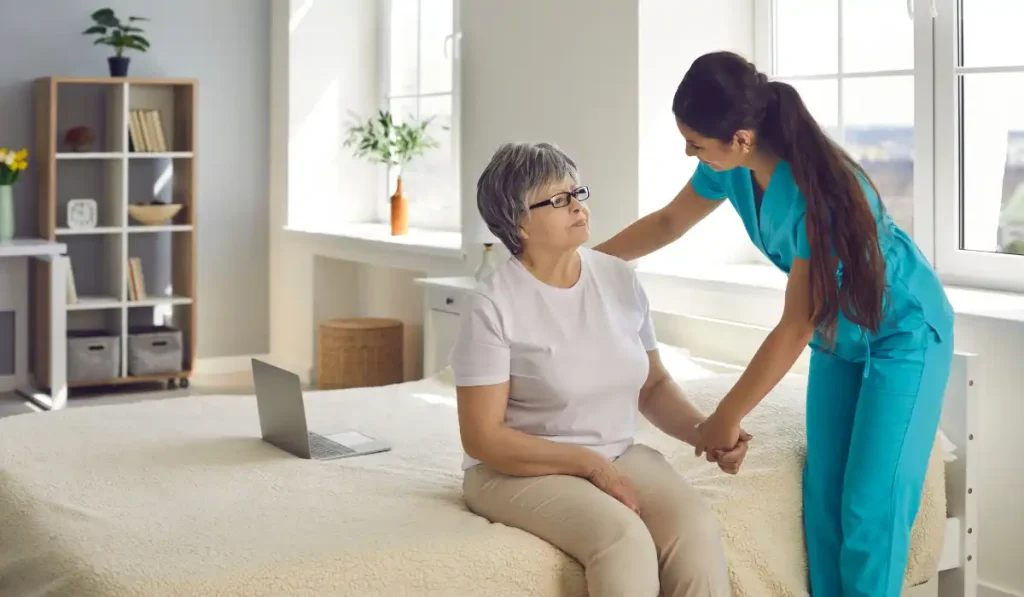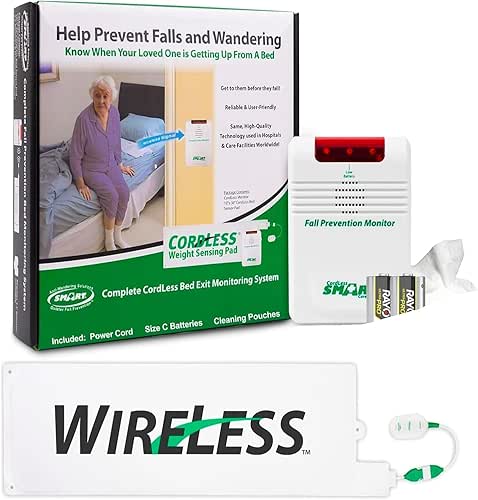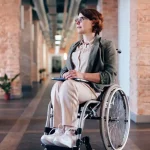As the saying goes, ‘safety comes first.’ When it comes to caring for your loved ones with dementia, ensuring their safety and security becomes paramount. And one way to do this is by investing in the right bed alarm.
But with so many options available, how do you choose the best one for your specific needs? Let’s explore the top 5 bed alarms designed to provide peace of mind for you and safety for your loved ones, so you can make an informed decision about the best option for your family.
Key Takeaways
- Bed alarms for dementia patients provide immediate alerts when the patient tries to stand, ensuring their safety and preventing falls.
- The choice of low or high volume and customizable chime options allow for personalized alarm settings that suit the user’s needs.
- Wireless connectivity and a wide range of transmission signals make bed alarms convenient and versatile for caregivers.
- When choosing a bed alarm, factors to consider include durability, ease of setup, positive customer reviews, and warranty options.
Patient Bed Alarm with Motion Sensor and 2 Ring Chime Options
What we like
- Immediate alerts when the patient tries to stand
- Choice of low or high volume and 2 sounds for customizable chime options
- Easy to reset the alarm with convenient and portable design
What we don’t like
- some customers say alarm stopped working after a month
If you’re seeking a bed alarm system that offers immediate alerts and customizable chime options, the ‘Patient Bed Alarm with Motion Sensor and 2 Ring Chime Options‘ is the ideal choice for dementia patients. This alarm comes with a motion sensor and a 10 x 30 bed pad, ensuring that any movement from the patient triggers the alarm. The system also provides 2 ring chime options and 3 mounting options for versatile use.
Installation is quick and easy with the provided mounting accessories. The alarm itself emits a loud sound, and you have the option to choose between 80db or 90db. The tear-and-water-resistant vinyl material makes it durable and easy to clean. With positive customer reviews, a 1-year warranty, and stellar customer service, this alarm system offers both reliability and peace of mind for caregivers.
Best For: Dementia patients who require immediate alerts and customizable chime options for bed monitoring.
Lunderg Large Bed Alarm for Elderly Adults – Wireless Sensor Pad & Pager
What we like
- Provides peace of mind by alerting when loved ones get up from bed
- Wireless connectivity with a range of up to 300 ft.
- Anti-slip stickers to prevent pad movement and false alarms
What we don’t like
- Reviewer’s complaint about the volume of the pager in larger homes
The Lunderg Large Bed Alarm for Elderly Adults is an ideal choice for caregivers of dementia patients seeking reliable fall prevention and peace of mind.
Its wireless sensor pad and pager ensure that caregivers are alerted when their loved ones get up from bed. The system offers continuous alarm or vibration after the patient stands up from bed, reducing the risk of falls.
Anti-slip stickers prevent pad movement and false alarms, and the pad is easy to clean and incontinence-resistant. The wireless connectivity has a range of up to 300 ft, allowing caregivers to move around the house while staying connected to the patient.
The portable pager with adjustable volume and vibration settings enhances its convenience.
With positive feedback from caregivers and family members, this system comes highly recommended for caregivers of individuals with Alzheimer’s and memory issues.
Best For: Caregivers of dementia patients seeking reliable fall prevention and peace of mind.
Upgraded Bed Sensor Alarm and Fall Prevention for Elderly/Dementia, Caregiver Pager Motion Sensor Alarm
What we like
- Wireless motion sensors for discreet monitoring
- Wide range and effective transmission of signals
- Dual reminder system with LED lights and sound alerts
What we don’t like
- Some minor issues with battery reliability
For caregivers needing a reliable and easy-to-use monitoring solution, the upgraded bed sensor alarm and fall prevention system is an ideal choice for ensuring the safety of elderly and dementia patients.
This system features wireless motion sensors that can be discreetly placed under the bed or at the door to monitor movement. It transmits signals to receivers within a wide range, providing effective monitoring.
The motion sensor is designed to detect when a patient’s foot touches the floor without triggering false alarms, offering peace of mind to caregivers.
The dual reminder system, comprising LED lights and sound alerts, ensures that caregivers are immediately notified.
With its easy setup, wide range, and multiple alarm tones, this upgraded system offers a practical and affordable solution for caregivers seeking to enhance the safety of their loved ones.
Best For: Caregivers seeking a reliable and discreet monitoring solution for elderly and dementia patients.
Caregiver Pager Indoor Motion Sensor Alarm (2 Pager+1 Sensor)
What we like
- Versatile use for home, business, and medical facilities
- Easy installation and battery-powered sensor
- Multiple visual and sound alert options
What we don’t like
- Some users reported issues with sound after extended use
Ideal for keeping track of movements and providing timely alerts for dementia patients, the Caregiver Pager Indoor Motion Sensor Alarm (2 Pager+1 Sensor) offers reliable monitoring and fall prevention. This wireless caregiver pager includes one motion sensor and two pagers, transmitting signals to receivers within a 500ft/150m range in an open area.
The motion sensor detects movement within a 16.4ft range and 110°, providing visual and sound alerts. With LED light indicators for visual alerts, the pager offers 58 ringtones and 5 adjustable volumes. The easy installation, battery-powered sensor requires no charging, and each receiver can be paired with up to 20 transmitters.
Customers have praised its versatility, with some using it for dementia patients and others for home and business entry alerts. The product has received positive feedback for its effectiveness and ease of installation, although a few users have reported issues with sound after a period of use.
Best For: This product is best for caregivers and family members looking to monitor and provide timely alerts for elderly individuals, particularly those with dementia or mobility issues.
Smart Caregiver Wireless Bed Alarm System
What we like
- Reliable and effective emergency alert system
- Alerts caregivers when a patient gets off the bed alarm pad
- Compatible with various medical alert devices
What we don’t like
- Takes trial and error to work correctly
When caring for dementia patients, consider the Smart Caregiver Wireless Bed Alarm System as a reliable and effective emergency alert system. Used by over 2,800,000 caregivers worldwide for 25 years, it detects bedside movement from up to 300 feet away, ensuring the safety of elderly patients.
The system alerts caregivers when a patient gets off the bed alarm pad, providing peace of mind and allowing for timely assistance. With the wireless alarm monitor capable of being placed up to 300 feet away from the bed, noise from the patient’s room is eliminated. Additionally, caregivers can monitor up to six Smart Caregiver devices simultaneously from one pager.
The system’s compatibility with nurse call buttons, motion sensors, and cordless weight sensing pressure pads and floor mats makes it a consistent medical alert system for seniors, adults, disabled individuals, and hospital patients.
Best For: Caregivers of elderly patients, dementia patients, and individuals in need of fall and wandering prevention.
Factors to Consider When Choosing Bed Alarms For Dementia Patients
When choosing bed alarms for dementia patients, consider the following factors:
- Alarm system features: Look for alarms that have features such as adjustable sensitivity levels, different alarm sounds, and easy-to-use controls. These features can help customize the alarm system to meet the specific needs of dementia patients.
- User experiences: Read reviews and testimonials from other caregivers or healthcare professionals who have used the bed alarms. Their experiences can provide valuable insights into the reliability and effectiveness of the alarms.
- Limitations and concerns: Be aware of any limitations or concerns associated with the bed alarms. For example, some alarms may have a delay before activating or may not work reliably if the patient moves frequently. Understanding these limitations can help you choose an alarm system that best suits your needs.
- Product specifications: Pay attention to the specifications of the bed alarms, such as the range of detection, battery life, and compatibility with different bed types. These details can help you determine if the alarm system is suitable for your specific requirements.
- Customer feedback: Take into account the feedback and ratings given by other customers who have purchased and used the bed alarms. Their opinions can provide valuable insights into the overall satisfaction and performance of the alarms.
Alarm System Features
Consider the loudness of the alarm, ranging from 80db to 90db, when selecting a bed alarm for dementia patients. The volume level is crucial for ensuring that the alarm is loud enough to alert caregivers but not overly disruptive to the patient.
Additionally, look for systems with a test button for previewing the alarm and a 9V battery included for operation. Some alarms are tear-and-water-resistant with latex-free material for easy cleaning, providing durability and hygiene.
User experiences emphasize the importance of immediate alerts, portability, and multiple attachment options for versatility. Furthermore, certain systems offer features like wireless connectivity, anti-slip stickers, and battery-powered sensors, enhancing convenience and safety.
Prioritizing these alarm system features will help in choosing the most suitable bed alarm for your loved one with dementia.
User Experiences
You may have noticed that multiple users reported the effectiveness of the bed alarm, providing peace of mind for caregivers of dementia patients.
Some users mentioned issues with the loudness of the alarm tone and concerns about the pad’s durability.
Positive experiences were shared about the convenience and effectiveness of the pager in monitoring movements. Users appreciated the portability and versatility of the alarms, especially for caregivers of individuals with dementia.
However, a few negative experiences were highlighted, including issues with the product’s performance and disappointment with the system.
It’s important to consider these varied user experiences when choosing a bed alarm for a dementia patient, as they can provide valuable insights into the overall satisfaction and functionality of the product.
Limitations and Concerns
Some users who previously found the bed alarm effective for monitoring dementia patients also encountered limitations and concerns with the system.
One issue was with the durability of the alarm. Several users reported that the alarm system stopped working after a short period of use, raising concerns about its longevity and reliability.
Another concern was the discomfort caused by the loud alarm tone. Some users found the alarm to be too loud and reported that it agitated the dementia patients.
There were also drawbacks related to return policies and the need for pad and monitor replacements after a year. Limited return policies made it difficult for users to seek refunds or replacements, while the need for replacements added to the cost and inconvenience of using the system.
Reviewers also mentioned specific complaints about the pad and pager. The loud crinkling sound of the pad and the volume of the pager in larger homes were both sources of frustration for users.
Product Specifications
When selecting bed alarms for dementia patients, it’s crucial to carefully evaluate the product specifications to ensure they meet the specific needs and requirements of the patients and caregivers.
Look for alarms that offer easy and quick installation with provided mounting accessories, as well as loud alarm options (80db or 90db) with a test button for preview.
Additionally, prioritize alarms made of tear-and-water-resistant vinyl material and offering a 1-year warranty. Positive customer reviews and multiple attachment options are also important factors to consider.
Wireless connectivity with a range of up to 300 ft. is beneficial for added flexibility and convenience.
Lastly, ensure the alarm comes with a 1-year warranty to guarantee its durability and functionality.
Customer Feedback
Customer feedback is a valuable resource for evaluating the effectiveness and reliability of bed alarms for dementia patients. Many users have shared positive experiences with certain bed alarms, highlighting their effectiveness in alerting caregivers to potential safety concerns. However, some have expressed concerns about the durability and false alarm rates of certain models.
Price comparison feedback has also been helpful, with users providing insights into the value for money offered by different bed alarms. Recommendations from other caregivers can also be beneficial in making an informed decision.
It’s important to consider a range of customer feedback to gain a comprehensive understanding of the various bed alarms available and their suitability for your loved one’s specific needs.
Pricing and Warranty
Continuing from our exploration of customer feedback, it’s important to consider the pricing and warranty options when choosing a bed alarm system for dementia patients. Compare the pricing and warranty options across different bed alarm systems to find the best value for the features needed.
Look for bed alarms that offer a reasonable cost along with a warranty for peace of mind. Consider the warranty length and coverage when evaluating the overall cost of the bed alarm system.
Check customer reviews for feedback on the pricing and warranty satisfaction of the bed alarm systems. By evaluating the pricing and warranty details, you can make an informed decision on the purchase of a bed alarm system.
This step is crucial in ensuring that the chosen bed alarm not only meets your requirements but also provides the necessary support and coverage.
Frequently Asked Questions
How Long Do the Batteries Typically Last in These Bed Alarms?
Batteries in these bed alarms typically last around 6 months with regular use. To ensure continuous functionality, it’s recommended to replace the batteries on a semi-annual basis. This helps in maintaining the effectiveness of the alarm system.
Can These Bed Alarms Be Used on Different Types of Beds, Such as Hospital Beds or Adjustable Beds?
Yes, these bed alarms can be used on different types of beds, such as hospital beds or adjustable beds. They are versatile and easy to install, providing peace of mind and safety for your loved ones.
Are There Any Specific Cleaning or Maintenance Instructions for the Sensor Pads or Motion Sensors?
To keep the sensor pads or motion sensors in good condition, wipe them with a damp cloth and mild detergent as needed. Regularly check for any signs of wear or damage, and replace if necessary to ensure proper functioning.
Can the Caregiver Pager Be Used With Multiple Sensors in Different Rooms?
Yes, the caregiver pager can be used with multiple sensors in different rooms. It allows you to monitor and respond to alerts from various locations, providing flexibility and ensuring the safety and security of your loved ones.
Are These Bed Alarms Covered by Any Warranty or Guarantee?
Yes, these bed alarms are covered by a one-year warranty. It provides peace of mind knowing that your investment is protected. If any issues arise, you can rely on the warranty for support.







